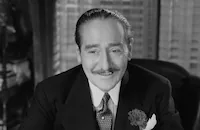The Bachelor's Daughters
Brief Synopsis
Cast & Crew
Andrew Stone
Gail Russell
Claire Trevor
Ann Dvorak
Adolphe Menjou
Billie Burke
Film Details
Technical Specs

Synopsis
At a going-away party, former silent movie star Molly Burns, who has been pensioned from her job at the Royal Department Store, chats with co-workers Marta, Cynthia and Eileen McFarland. The younger women fear that they are headed for Molly's fate if they do not find wealthy men to marry. Their discussion is interrupted by the arrival of Terry Wilson, another colleague, and the unpopular, tight-fisted store floorwalker, Alexander Moody. Terry, a singer, suggests that the six of them pool their money, pose as a wealthy family and rent the empty Long Island mansion next door to theatrical producer Dillon so that they can meet eligible bachelors, and she can impress Dillon with her singing voice. Molly agrees to play the part of their mother, and the women draft a reluctant Moody to act as their father. They furnish one room with furniture rented from a theatrical supply house, while the rest of the house remains empty. Soon after their arrival, Terry gardens while singing loudly, but rather than impressing Dillon, she angers him when she cuts down the hedge that separates their two houses. To make amends, Terry invites him for cocktails that evening along with wealthy young neighbors Bruce Farrington and Schuyler Johnson. At the party, the irascible Moody goads Dillon until he agrees to listen to Terry sing, and Dillon then offers her a job. After Dillon leaves, Moody demands ten percent of Terry's contract for his services. Later, when Cynthia, Eileen, Terry and Bruce all go to dinner, Marta hears Schuyler play the piano and suggests that he become a professional. He explains that his father, who owns the Royal, wants him to take over the store after he has learned the business from the bottom. After swearing Schuyler to secrecy, Marta divulges the truth about her living arrangements and invites him to defy his father and move in with them. Soon he gets a job playing the piano in Terry's show, and he and Marta marry. Several days later, Eileen, who needs an outfit for a date with Bruce, borrows some expensive clothes from the store, claiming that she is delivering them to a customer who is actually out of town. Eileen intends to take advantage of the store's liberal return policy and replace the items before the bill is due. In the meantime, Cynthia starts dating wealthy yachtsman Miller, who warns her that he never intends to marry. When Miller admires Eileen's clothes, a jealous Cynthia investigates and learns that the clothes are charged to a customer's account. She assumes that the customer's husband has paid for the clothes and insinuates this to Bruce, who breaks off his engagement to Eileen. Eileen brings back the clothes, but is informed that store policy has changed and it is too late to return them. Moody, who suspected the truth all along, suggests that Eileen tell Bruce what really happened and ask for the money to pay for the clothes, but she refuses because she loves him too much to take advantage of him. After a brokenhearted Eileen tries to commit suicide, Cynthia, who knows she made a mistake, persuades Miller to give her the money for the clothes. When Eileen tries to pay her bill, however, she learns that Moody has already done so and has recommended that store not prosecute her. Moody then tells Eileen that Bruce wants to marry her and has repaid him at a profit. On Terry's opening night, Schuyler's father comes backstage, planning to expose Moody and the others as frauds. Moody then reveals that he and Molly married three days before, and the women declare that he has in reality acted so much like a father that they have become a real family. Cynthia, who was planning to go to Cuba with Miller, has second thoughts and joins her friends for a family photo.

Director

Andrew Stone
Cast

Gail Russell

Claire Trevor

Ann Dvorak

Adolphe Menjou

Billie Burke

Jane Wyatt
Bill Kennedy
Damian O'flynn

Russell Hicks
John Whitney
Eugene List
Earle Hodgins
Margo Crane
Igor Diega
Crew
Howard A. Anderson
Ludwig Van Beethoven
David Chudnow
Mario De Silva
Maria O. Donovan
Irving Drutman
Rudi Feld
Edward F. Finney
Kermit Goell
Max Hutchinson
Frederick Jackson
Joseph I. Kane
Jack Lawrence
Duncan Mansfield
Don Mcelwaine
Bernard Mceveety
Eddie J. Nelson
Jack Noyes
Heinz Roemheld
Aaron Rosenberg
Sophie
Theodore Sparkuhl
Fred Spielman
Earl Stafford
Andrew Stone
Andrew Stone
Andrew Stone

Film Details
Technical Specs

Quotes
Trivia
Notes
The film's working title was Fifty Million Women. According to a October 20, 1945 Los Angeles Examiner news item, producer Andrew Stone's original story idea so interested writer Mildred Cram that she offered to write it as a magazine serial. It has not been determined if the serial was actually written or published. The film opens with an unidentified clip from a silent film starring Billie Burke and Thomas Meighan. Burke and Meighan made two films together: Arms and the Girl and The Land of Promise, both 1917 Paramount films directed by Joseph Kaufman (see AFI Catalog of Feature Films, 1911-20; F1.0147 and F1.2398). The filmmakers approached Jeanette MacDonald to play the role of "Terry Wilson." The Bachelor's Daughters marked the motion picture debut of concert pianist Eugene List, who, as a soldier, played for President Harry Truman, Premier Joseph Stalin and Prime Minister Winston Churchill at the Potsdam Conference. According to a April 21, 1946 New York Times news item, Andrew Stone purchased several rooms from Cornelius Vanderbilt's Fifth Ave. mansion to use as sets for the film. The rooms had been in storage since the mansion was torn down, and Stone was able to buy them for approximately $1,000. The film was reissued in 1950.












